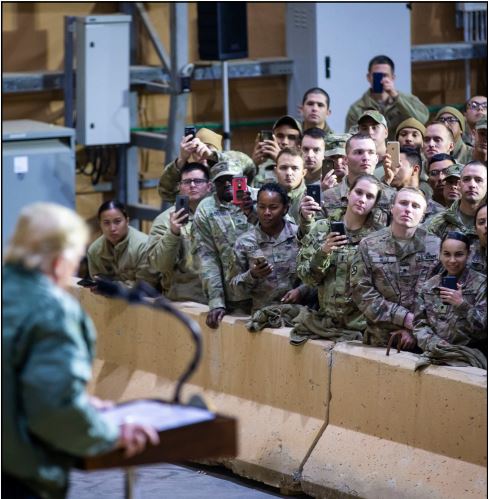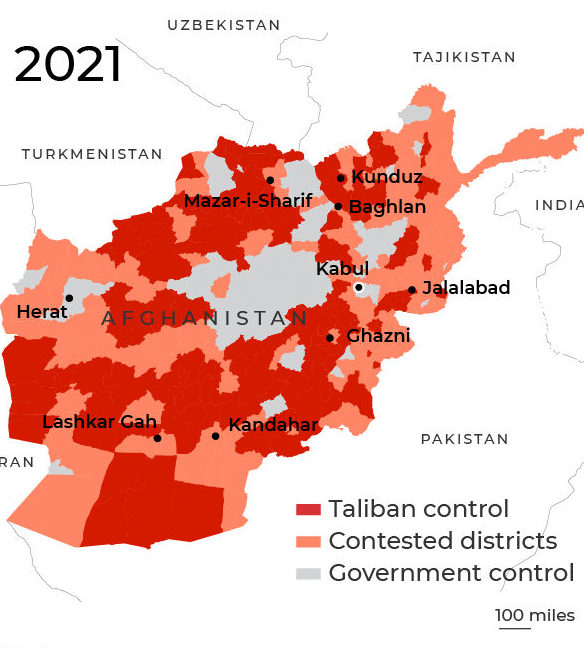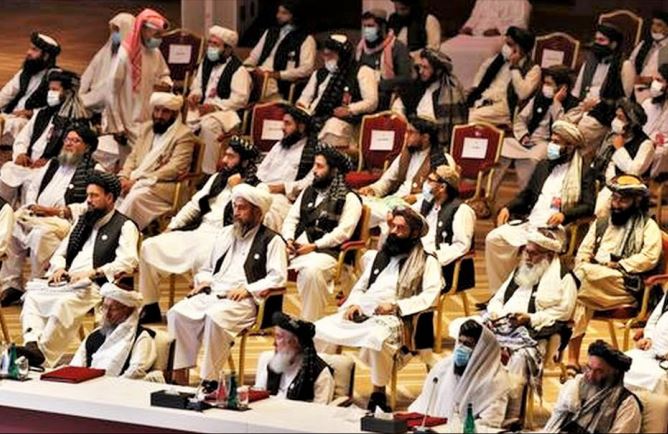The Taliban are asking for a political deal, they are likely to be a leading partner in the forthcoming semi-inclusive political dispensation of Afghanistan. All eyes are focused on the US sponsored intra-Afghan dialogue, the international community awaits with bated breath whether there would, at all, be a treaty or the Korea model of ending war without a peace treaty would be replicated, leaving behind a perennial conflict. The ongoing spell of constructive-destructive chaos is indeed a defining moment for the people of Afghanistan. No matter what trajectory the events take, one may assume a Taliban dominant regime in Afghanistan by end of 2022, even though it may last for a short time.
The Afghan war was started as a ‘Just War’, with unanimous global backing. However, soon it began to lose purpose and went haywire, degenerating into an unwanted war through ‘Wrong War’. President Barrack Obama was stuck with an obsession to bring it to a close without having to acknowledge the US defeat; this end objective soon became a bipartisan craze.
President Donald Trump entered the White House with a firm grounding that keeping around 10,000 US troops in Afghanistan was a perennial necessity. He had promised to bring some of the ongoing US wars to a responsible end. Soon after assuming Presidency, he tested the ‘Mother of All Bombs’ on the Afghan people (April 13, 2017) to demonstrate that ending the Afghan war was a distant low priority for him. Trump tried his hand on the Syrian and Iraqi wars for a closure, but failed. Approaching the twilight of his first term coming to a close, with little to report back to the people of the US with regard to ending the ongoing wars, Trump decided to end the Afghan war as soon as possible, come what may! Multidimensional pressures were exerted on Pakistan to deliver the Taliban for a deal with the US, a deal was signed on February 29, 2020. And, the phased runaway of US troops was to complete by end of May 2020.
As President Joe Biden sent confusing signals casting an impression of abandoning the US-Taliban deal immediately after his inaugural, Pakistan remained calm, its calculus indicated that Biden did not have many options with regard to the Trump-Taliban deal, and that he won’t go beyond few cosmetic adjustments to steal a bit of credit from Trump for bringing this foolish war to a close. Biden inherited a military capability in Afghanistan comprising of 2500 soldiers, which could not sustain pursuit of any worthwhile strategic or military operational objectives. For his ego satisfaction Biden changed the completion of pull-out schedule from end May to 9/11, to coincide with the twentieth anniversary of the Twin Towers’ collapse.

The Taliban reacted ferociously to Biden’s delay on the withdrawal schedule. Their attacks on their Afghan adversaries were so forceful that Afghan territories started falling to the Taliban like a house of cards raising concern whether the foreign troops could withdraw safely. Commander US Forces in Afghanistan relinquished his command in panic and the indecent haste in vacation of Bagram Air Base during the darkness of night and without formal transfer of Command and Control to Afghan National Defence and Security Forces (ANDSF) spoke volumes about fears of the known and the unknown.
The Taliban continue to make rapid advances across length and breadth of country. [So-called] President Ashraf Ghani remains foolishly over-confident that his arch rival Dr Abdullah Abdullah negotiating with the Taliban in Doha would secure a new lease of life for his presidency. He also thinks that the US will continue to support ANDSF, unconditionally and whole heartedly. He said, “I spoke with President Biden over a phone call. We discussed the evolving but continuing relationship between the two countries. President Biden reassured me that support for the ANDSF will continue. We have confidence that they will protect and defend Afghanistan”. Ghani fails to note that the US President has linked all aid to Afghanistan to approval by Congress, which is quite weary about wasting another single penny in Afghanistan. Other forums like Friends of Afghanistan are also feeling donor fatigue, as their showering of money did not translate in to any tangible benefits. Reportedly, the likes of Ghani and Karzai have already relocated most of their near and dear ones to safe heavens offered by foreign occupiers. Most of the Afghans who acted as informers of foreign forces have also fled to the respective countries of their benefactors. Ghani himself is waiting for the last flight that could safely take off from Kabul to Washington.
General Mark Milley, the chairman of the US Joint Chiefs of Staff, has acknowledged that the Taliban control about half of Afghanistan’s district centres, indicating a rapidly deteriorating security situation. Other sources place the area under Taliban control between 65-85 percent. Uncertainty has been mushrooming during recent weeks, largely stimulated by fighting in most provinces even as the occupation troops complete their withdrawal and the Taliban launch major offensives, taking districts and border crossings. Now they control most of the border crossings with their neighbours.
“Strategic momentum appears to be sort of with the Taliban,” General Milley recently told reporters. He said more than 200 of the 419 district centres and their lines of communication were under Taliban control whereas in June the Taliban had controlled only 81 district centres. Due to an understanding with the US, the Taliban have not taken over any provincial capitals, however, they are putting pressure on the outskirts of most of them. Afghan troops are in a state of exodus, they are surrendering to Taliban in droves and that too without fighting.
Moreover, during a July 22 meeting to discuss the situation in Afghanistan and developments about Afghanistan peace negotiations, envoys highlighted five elements of a final settlement: “(1) inclusive governance; (2) the right to elect political leaders; (3) protections for human rights, including rights of women, youth and minorities; (4) commitments on counter-terrorism, including to ensure that Afghanistan does not again serve as a safe haven for terrorists; and (5) adherence to international law, including international humanitarian law”. These envoys are foolhardy enough to assume that they still have the leverage to dictate to the Taliban.

Taliban spokesperson Dr. Naeem responded: “Although the Islamic Emirate is now in a strong military position, its policy on peace has not changed. The Islamic Emirate prefers to resolve the Afghan problem through dialogue. We have no foreign agenda. We do not interfere in anyone’s internal affairs and we do not allow anyone else to interfere in our internal affairs”.
With regard to concern whether the 1990s-era regional proxy war could be replicated, Taliban have surprised many by taking over much of Northern Afghanistan epicentre of erstwhile proxy war in the past few weeks. They’ve also expanded their presence along other borders as well. This has pre-emptively thwarted the possibility of foreign actors providing sustained military support to any potential proxies there.
Pakistan is considered a key player in the peace process in Afghanistan given Islamabad’s historical influence over the Taliban. A lot of praise is pouring in from all over appreciating its constructive role towards Afghan peace process. Recently a US embassy statement emphasised that “[Pakistan’s] tangible and material support” for the Afghan peace process is vital for its success.





